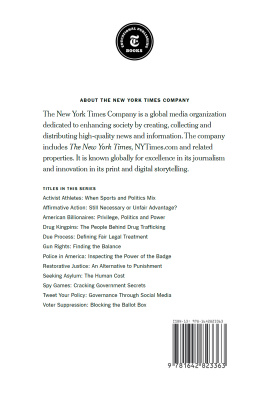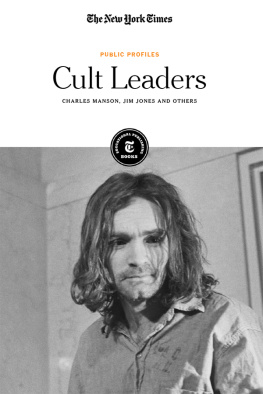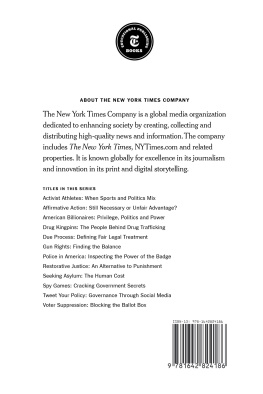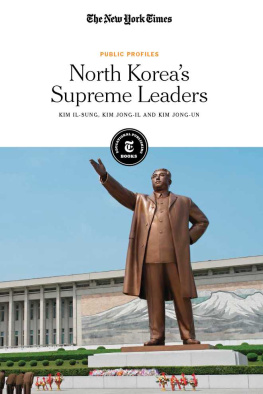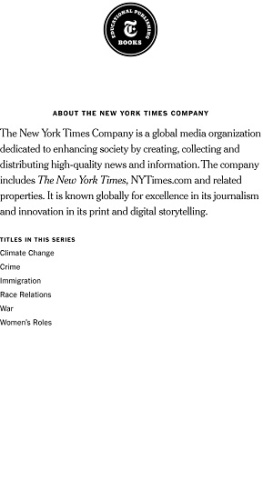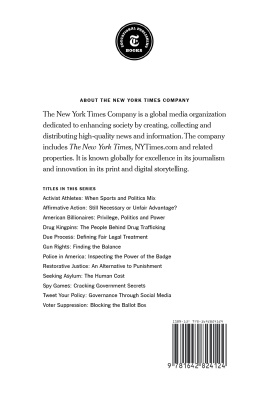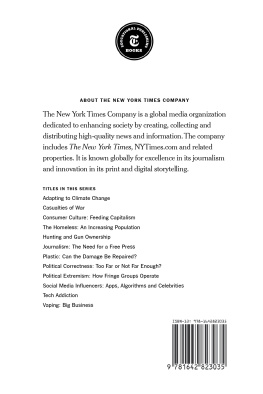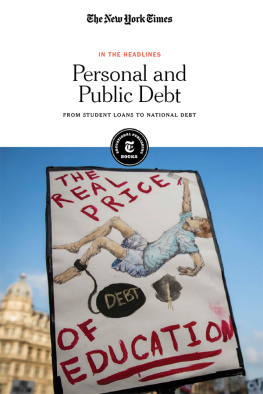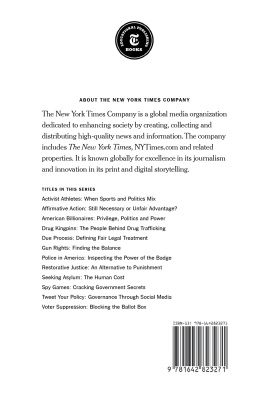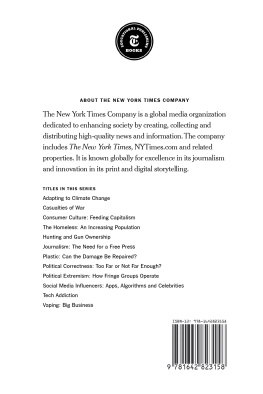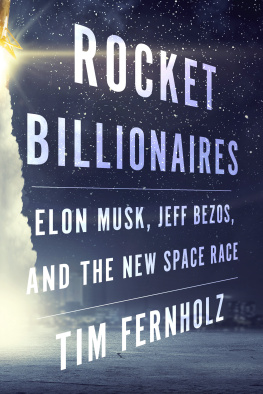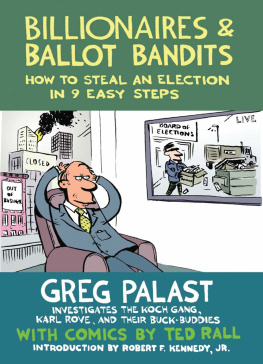
Published in 2021 by New York Times Educational Publishing in association with The Rosen Publishing Group, Inc.
29 East 21st Street, New York, NY 10010
Contains material from The New York Times and is reprinted by permission. Copyright 2021 The New York Times. All rights reserved.
Rosen Publishing materials copyright 2021 The Rosen Publishing Group, Inc. All rights reserved. Distributed exclusively by Rosen Publishing.
First Edition
The New York Times
Caroline Que: Editorial Director, Book Development Phyllis Collazo: Photo Rights/Permissions Editor Heidi Giovine: Administrative Manager
Rosen Publishing
Megan Kellerman: Managing Editor
Julia Bosson: Editor
Greg Tucker: Creative Director
Brian Garvey: Art Director
Cataloging-in-Publication Data
Names: New York Times Company.
Title: American billionaires: privilege, politics and power / edited by the New York Times editorial staff.
Description: New York: New York Times Educational Publishing, 2021. | Series: In the headlines | Includes glossary and index. Identifiers: ISBN 9781642823363 (library bound) | ISBN 9781642823356 (pbk.) | ISBN 9781642823370 (ebook) Subjects: LCSH: BillionairesPolitical activityUnited States. | Rich peoplePolitical activityUnited States. | Wealth Political aspects. | United StatesPolitics and government21st century. Classification: LCC HC79.W4 A475 2021 |
DDC 320.97308621dc23
Manufactured in the United States of America
On the cover: As of 2019, there are more than 600 billionaires in the United States, ranging from tech moguls to hedge fund managers and C.E.O.s; Dmitry Rukhlenko/Shutterstock.
Contents
Introduction
IN 2019, the Democratic Presidential primary candidate Bernie Sanders sent out a tweet that grabbed headlines. Billionaires should not exist, he wrote, articulating the principle that undergirded his proposal for a wealth tax, which would take aim at the ultra-rich by targeting the full extent of their fortunes.
Sanders was articulating an idea that has gained increased traction in recent years, particularly among the Democratic base. Inspired in part by Sanderss own outspoken refrain on economic inequality, it has become a common refrain that the top 1 percent of earners control a vastly disproportionate amount of wealth in the American economy. Some C.E.O.s earn thousands of times more than their average employees in wages alone, resulting in an economy where the wealthiest exponentially outpace low- and middle-earners. And as policies put forth by the Trump administration further slash the tax rates of the ultra-rich, it seems likely these dynasties of wealth will continue for generations to come.
The line between billionaires and celebrities has blurred in American culture. To many, they represent the apex of the American dream, the product of hard work, innovation and creative vision. Each generation has produced its own set of billionaires: investors like Warren Buffett; hedge fund managers like George Soros; the family of Walmart founder Sam Walton; tech entrepreneurs like Bill Gates and Mark Zuckerberg. The contributions of these individuals have bolstered the economy, and their innovations have reshaped American culture, technology and real estate.
At the same time, the existence of these billionaires and their wealth has begun to attract increased scrutiny by activists and reformers alike. The economic growth that the United States experienced in the latter half of the twentieth century and the beginning of the twenty-first largely accelerated economic inequality rather than resolving it. While Jeff Bezoss Amazon, based in Seattle, became the second company to reach a valuation of one trillion dollars, allowing him to surpass Bill Gates as Americas richest man, Seattles homeless population surged in the last decade. In American history, there has arguably never been such a stark division between the nations wealthiest and the nations poorest.
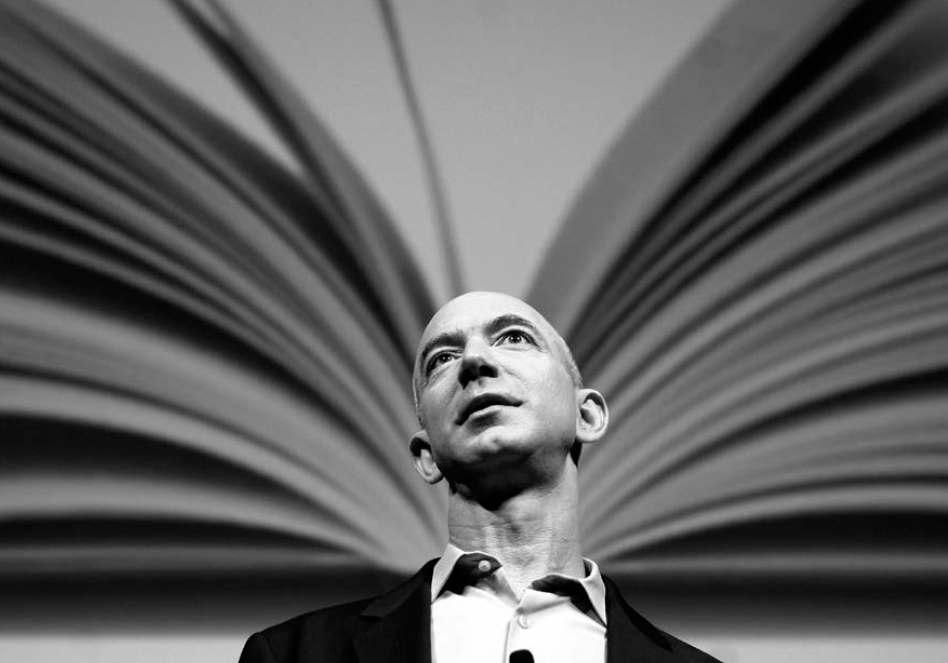
MICHAEL APPLETON FOR THE NEW YORK TIMES
Jeff Bezos, founder and chief executive of Amazon, during a news conference unveiling the Kindle 2 in 2009.
Reformers argue that billionaires can only build their businesses with the use of nationally subsidized highways and public transportation, and point to the ways that a wealth tax could support much needed public works projects. Critics have also argued that inherited wealth and demographic biases have made the dream of reaching the billionaire class remote for those not already inside of it. Statistically speaking, American billionaires are overwhelmingly white and male; there are few women of color, and Oprah Winfrey is the only black woman on Forbess list of Americas wealthiest people.
But billionaires point to their long history of philanthropy. Most have created philanthropic foundations that pour money into a variety of worthy causes, led by the model of Warren Buffett, who has pledged the majority of his fortune to charity. The Bill & Melinda Gates Foundation is now the largest private foundation in the world, while the Chan Zuckerberg Initiative has begun to invest in areas of health and education development.
Billionaires also put their money into political causes with massive implications. Families like the Koch brothers, the Mercers and the DeVoses have poured millions of dollars into supporting conservative policies. Others, like George Soros, have made massive contributions to liberal causes. The influence that this affords the billionaire class has opened up a debate on both sides of the aisle as to the extent to which individuals should be able to impact the workings of American democracy.
The moral, social and economic implications of the billionaire class will be debated in America for decades to come. In the meantime, as the articles in this book demonstrate, there is more work to be done to scrutinize both the means and the extent of accumulated wealth, as well as how it translates into power in determining the nations social, economic and political landscape.
CHAPTER 1
The World of the Superrich
It can be hard to conceive of the level of wealth actually held by the ultra-rich. To put it in perspective, Jeff Bezoss net worth, around $120,000,000,000, is more than the individual G.D.P.s of nearly 100 countries. The articles in this chapter introduce the economic and political circumstances that paved the way for the billionaire class, examining the spread of its influence and extent of its power. They also pose one of the key questions of our time: Should anyone have the right to be a billionaire?
A Quiet Meeting of Americas Very Richest
BY A. G. SULZBERGER | MAY 20, 2009
THERE ARE FEWER billionaires in these tough economic times, so one might imagine that the remaining ones would attract more attention when they moved en masse. Yet when some of Americas most prominent capitalists met earlier this month at Rockefeller University, it took weeks before anyone noticed.
The secrecy continued even after IrishCentral.com, a Web site focused on Irish-American news, wrote on Monday about the May 5 gathering, reporting that the group discussed charitable giving.
Participants steadfastly refused to reveal details about the meeting, citing an agreement to protect the confidentiality of the discussion.
Mayor Michael R. Bloomberg, who was there, revealed little in a brusque response to a question on Wednesday afternoon. Anytime I have a meeting thats not on the public schedule, its not going to be on the public schedule, he said.
Next page
